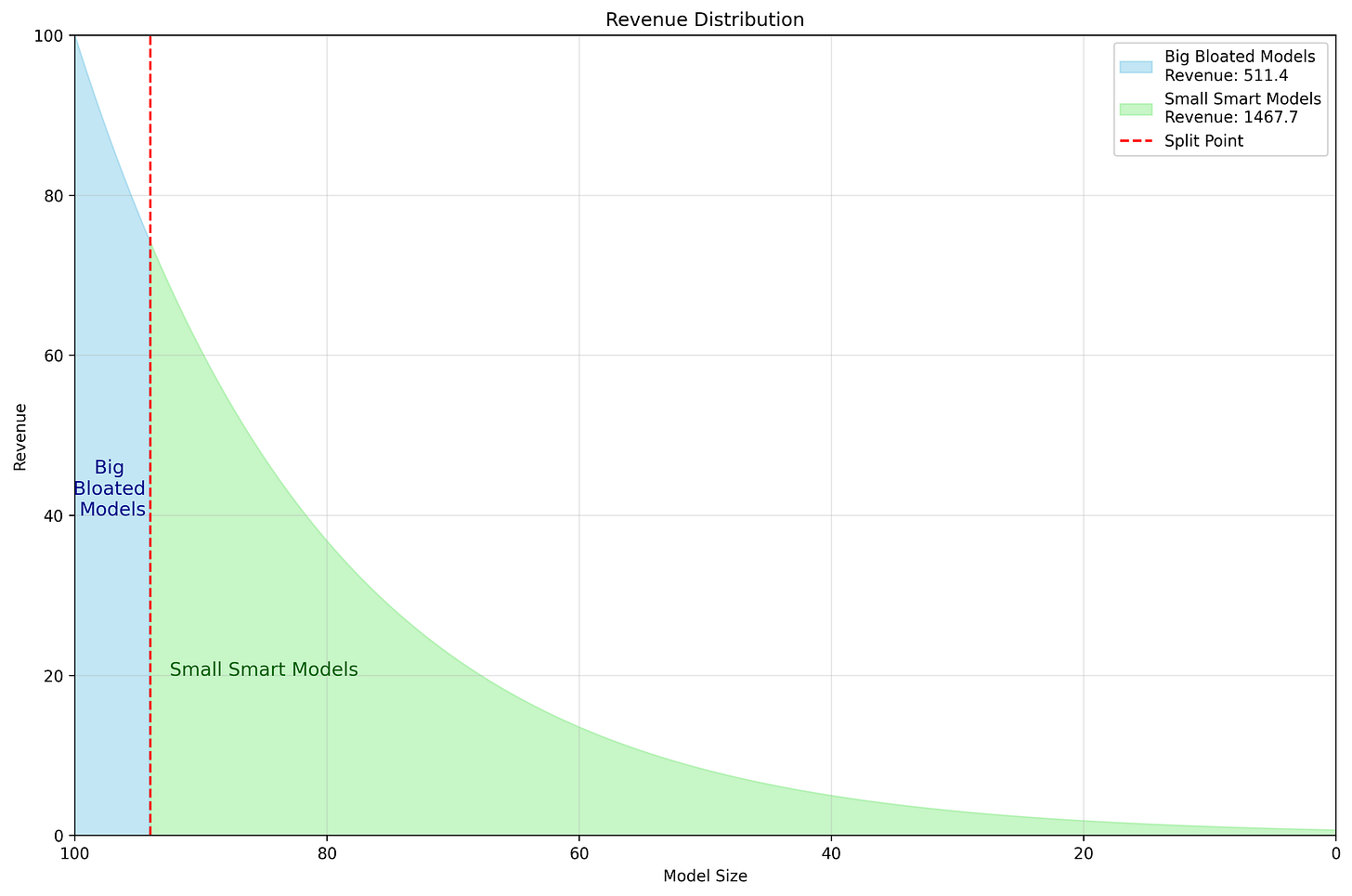Yesterday was a big day on Wall Street: Spooked by DeepSeek, Nvidia alone lost “$589 billion in market capitalization which is by far the single greatest one-day value wipeout of any company in history.”1 Yesterday's events sparked various narratives about the future of AI development. Some frame it as a geopolitical contest between China and the United States, while others see it as a corporate rivalry between DeepSeek and OpenAI.
In my view, however, DeepSeek’s emergence suggests a more transformative possibility:
“The future of AI lies in Small-Smart-Systems powered by Open-Source”
This vision challenges three current fundamental assumptions about AI development:
Big Bloated Models vs. Small Smart Models: The prevailing trend in AI has been to build ever-larger models requiring massive computational resources and energy consumption. These models, while powerful, often face diminishing returns and scalability challenges. Small-smart-systems, on the other hand, prioritize efficiency, adaptability, and solving targeted problems with minimal resources. They promise a future where AI is accessible, nimble, and sustainable.
Proprietary vs. Open Source: Proprietary AI systems dominate the market, often locking users into closed ecosystems with limited transparency and collaboration. Open-source AI, in contrast, fosters innovation by enabling a global community of researchers and developers to build on shared knowledge. This democratized approach can accelerate progress while reducing the concentration of power in the hands of a few tech giants.
Monopolies vs. True Market Competition: Today’s AI landscape is shaped by a handful of dominant players wielding outsized influence. These monopolistic structures stifle competition and innovation. By shifting toward open-source and smaller systems, the playing field could level, paving the way for true market competition and a healthier ecosystem where startups and independent researchers thrive.
DeepSeek may represent the first tangible step toward this alternative future—one where democratized AI development creates opportunities for innovators worldwide. By prioritizing open access, collaboration, and efficiency, this approach harnesses humanity's collective talent to tackle pressing challenges, from climate change to healthcare accessibility. This vision offers a path to AI that serves the common good, fostering innovation that benefits society as a whole rather than concentrating power and wealth in the hands of a few tech giants.
Long Tail of Innovation: The Future is Smart, Small and Global
The shift from US-dominated big bloated models to small smart systems isn't just speculation—it follows a well-established pattern in technological evolution. To illustrate this transformation, consider the following revenue distribution across the AI landscape:

While large models currently capture significant market attention and investment, the real revolution will happen in the long tail of innovation. This visualization reveals a crucial insight: the combined impact of small, efficient models (represented by the green area) actually surpasses that of their larger counterparts. This pattern suggests that the future of AI lies not in scaling ever-larger models, but in the collective innovation of countless smaller, more focused solutions.
DeepSeek’s breakthrough marks the beginning of this shift. As open-source tools and frameworks grow more sophisticated, we are likely to witness an explosion of specialized, efficient AI models that outperform their bloated predecessors in solving targeted problems. This democratization of AI development is leveling the playing field, enabling small teams, independent researchers, and developers across the globe to compete with tech giants on equal footing.
The implications are profound. Instead of a few dominant players dictating the direction of AI development through monopoly power, we can move toward a vibrant, decentralized ecosystem where thousands of smaller, smarter models collectively shape the future. his shift not only promises better technology but also a fundamental democratization of AI—where innovation is no longer constrained by computational resources or massive corporate budgets but is driven by human creativity and ingenuity.
Yesterday’s market reaction may be more than a momentary disruption—it could signal the dawn of a new era in AI development. An era where the collective power of small, smart, open-source solutions reshapes the landscape of innovation itself, unlocking opportunities for everyone.
Disclaimer
The views and opinions expressed in this post—and throughout my Substack—are purely speculative and intended for informational and discussion purposes only. They should not be taken as financial advice, investment recommendations, or any form of professional guidance. AI and related technologies are evolving rapidly, and any predictions or interpretations presented here are subject to significant uncertainty. Readers are encouraged to conduct their own research and consult with qualified professionals before making decisions related to the topics discussed.
https://www.forbes.com/sites/dereksaul/2025/01/27/biggest-market-loss-in-history-nvidia-stock-sheds-nearly-600-billion-as-deepseek-shakes-ai-darling/



